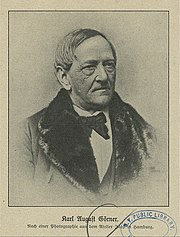Karl August Görner
Karl August Görner , also Carl August Görner (born January 29, 1806 in Berlin , † April 9, 1884 in Hamburg ) was an actor, director and playwright.
Biography and artistic work
Karl August Görner, son of a tax officer, became acquainted with the great stage performers of his time in his parents' house. a. with Ludwig Devrient , who lived in the same house and who became his friend and mentor. In 1822 he secretly left his parents' house in Berlin to devote himself to the stage and entered it first in Stettin (with the Curiotic Troupe ), then at the ducal court theater in Köthen .
At the age of 18 he was director of his own company, he moved around with it for two years, then in 1827 he was engaged at the court theater in Neustrelitz , where he eventually became chief director and theater director. There Görner played roles such as the worm in Kabale und Liebe , the Marinelli in Emilia Galotti , the Adam in Der zerbrochne Krug or the thread in Lumpazivagabundus . On May 22, 1832, he married the opera singer Friederike Tomasini (1810–1886), a daughter of the violin virtuoso and court concert master (Aloisio) Luigi Tomasini (1779–1858) in Neustrelitz . Görner's wife made her debut at the Neustrelitzer Hoftheater as Lorezza in the opera Jean de Paris (Johann von Paris) at the age of 16 . The marriage produced five children, two of whom also became actors. From his second marriage to the writer Ida Franziska Görner, b. von Buch, which Görner closed in Hamburg, had two more children.
In 1848 he went to Breslau , from here in 1853 to the Friedrich-Wilhelmsstädtische Theater in Berlin, took over the management of the Kroll Theater in 1855 and went to Hamburg in 1857, where he has since worked alternately as a character player and chief director at the Thalia and Stadttheater and in 1882 Celebrated 60th artist anniversary. In 1863 Ernst von Possart was appointed to replace Karl August Görner as a director at the Hamburg City Theater.
Before Görner moved to Hamburg, he sold his large geological collection to the Neustrelitz Grand Duke Georg . The collection known as the “Görnerianum” has since led a shadowy existence in Neustrelitz and was completely destroyed in the castle fire in 1945.
Görner died on April 9, 1884 during a rehearsal on the stage of the Thalia Theater. The (especially in the 1950 / 1960s) well-known actress and singer Christine Görner is his great-granddaughter.
Works (selection)
His first play: gardener and gardener , was performed in Freiberg in 1826. In the half-century that followed, he presented the German stage with around 150 pieces, of which more than 100 were in various collections, such as: Almanach of dramatic stage plays (Vol. 1–4, Breslau 1851-54; Vol. 5–9, Hamburg 1857-61; Vols. 10 and 11, Altona 1866-68), Lustspiele (Hamburg 1856-72,. 2 Vols.), Possenspiele (Altona 1862), Deutsches Theater (Altona. 1865 ff.) And others .
The best known include:
- Niece and aunt
- Black Peter
- English
- Snow White and the Dwarfs (children's fairy tale)
- A happy family man
- Auntie Undaunted
- En passant
- The ennobled merchant
- Education makes people
- Salt of marriage among others
Görner developed children's comedy as a special genre ( Kindertheater , Berlin. 1855, 6th vol.) And revived the old dramatic Christmas fairy tale in his Christmas fairy tale comedies (Hamburg 1879 - 1884, 18 vol.). He also published the Declamator for public and private companies (Hamburg 1864-70, 3 vol.), Concert and Society Declamator (original work, 1879, 9 vol.) And the humorous guide to Helgoland and on Helgoland (6th edition 1883).
literature
- Olaf Biese: Carl August Görner (1806–1884). News about the life and work of the Neustrelitz theater director. In: New series of publications from the Karbe-Wagner-Archiv Neustrelitz 7. Thomas Helms Verlag , Schwerin 2009, pp. 19–42.
- Grete Grewolls. Who was who in Mecklenburg-Western Pomerania ?, Bremen 1995, p. 160
- Hermann Arthur Lier: Görner, Karl August . In: Allgemeine Deutsche Biographie (ADB). Volume 49, Duncker & Humblot, Leipzig 1904, p. 462 f.
Web links
- Literature by and about Karl August Görner in the catalog of the German National Library
- Literature about Karl August Görner in the state bibliography MV
| personal data | |
|---|---|
| SURNAME | Görner, Karl August |
| BRIEF DESCRIPTION | German actor and stage poet |
| DATE OF BIRTH | January 29, 1806 |
| PLACE OF BIRTH | Berlin |
| DATE OF DEATH | April 9, 1884 |
| Place of death | Hamburg |
